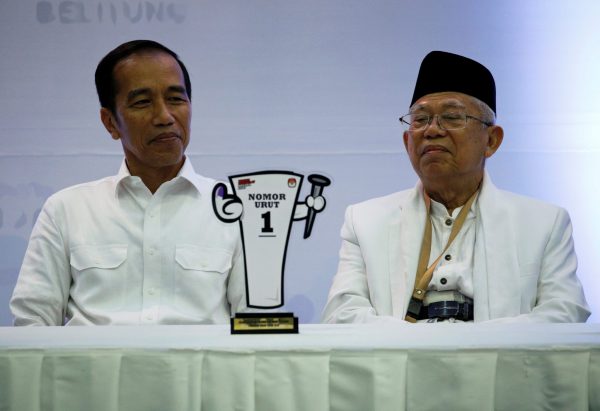The biggest blow to home-grown sectarianism transpired during Widodo’s first term in office. In 2017, a hardline Islamic coalition used a tenuous blasphemy charge to defeat and jail the President’s close ally — the ethnic-Chinese, Christian and then governor of Jakarta Basuki Tjahaja Purnama (known as Ahok) — and raise unfounded charges that the President himself was un-Islamic.
One of the key instigators behind these developments was conservative Muslim cleric Ma’ruf Amin, who to the surprise and dismay of secularists and ethnic and social minorities alike is now Widodo’s choice of running mate for the 2019 elections.
Despite claims that the decision was forced on him by coalition partners, Widodo chose Amin for one reason and one reason only: to split the conservative Muslim vote. This is an issue which has clearly haunted the President since the Ahok debacle.
The President first sought to co-opt Amin after the 2016 mass demonstrations that led to Ahok’s defeat, bringing him in as an adviser to curry favour with Muslim conservatives. The cleric responded by declaring his support for the Pancasila state ideology and the Islam Nusantara philosophy of Nahdlatul Ulama — Indonesia’s largest Muslim organisation — both of which promote pluralism and inclusiveness.
Analysts found it difficult to equate this with Amin’s past record as the architect of 2005 Indonesia Ulama Council edicts against secularism, pluralism and liberalism, and an inflammatory 2008 fatwa outlawing the teachings of the Muslim sect Ahmadiyah.
But what galled most pluralists was Amin’s involvement with a coalition of hardline groups under the umbrella of the 212 Movement, named after a rally on 2 December 2016 that brought a million people onto Jakarta’s streets to demand Ahok’s arrest. Afterward, Amin appeared as an expert witness at Ahok’s controversial blasphemy trial, where the outgoing governor was convicted and sentenced to three years’ imprisonment.
Jokowi’s challenger Prabowo Subianto, a Muslim from a family of Christians, has not been shy in consorting with Islamic groups when it suits him. He sought their support in his power struggle with armed forces chief Wiranto in the dying days of Suharto’s New Order regime, and in his unsuccessful but spirited bid for the presidency in 2014.
Prabowo also had no hesitation in resorting to primordial tactics in the 2017 Jakarta gubernatorial election, where he backed the ultimately victorious Anies Baswedan. But on the wider national stage, he now realises there is more to be gained by attacking Widodo on economic issues, particularly with the growth rate stuck at 5 per cent, and the President’s reliance on China for infrastructure funding.
Prabowo’s change of tactics reportedly prompted Widodo to remove Finance Minister Sri Mulyani Indrawati from his electoral success team so that she could concentrate on managing the state budget and other related issues. The economy will require careful attention in the lead-up to the national elections, particularly keeping food prices in check.
If he is smart, Prabowo will refrain from criticising ethnic-Chinese tycoons for their disproportionate hold over the Indonesian economy, something he has done in the past. Those same businessmen have always spread their largesse at election time, but in this race Widodo’s choice of Amin and the corporate connections of Prabowo’s running mate, wealthy businessman Sandiaga Uno, may persuade them to spend more freely on the Prabowo campaign.
Indeed, the President now runs the risk of alienating pluralists and ethnic and social minorities alike. They might not vote for Prabowo but there are growing calls to abstain, which could do considerable damage unless Widodo is able to demonstrate by the tone of his campaign that he is in charge and prepared to take a firm line with religious extremists.
The President has a difficult task ahead to rein in the country’s trend towards religious intolerance. The Jakarta-based Setara Institute recorded 109 violations of constitutionally guaranteed freedom of religion and belief across 20 of Indonesia’s 34 provinces between January and July 2018. This is a significant increase on the 80 incidents over the same period in 2017.
The House of Representatives is also considering proposed amendments to Indonesia’s colonial-era Criminal Code that, among other things, will ban same-sex relations, premarital sex, cohabitation among unmarried couples, sex education and even condom distribution.
Like the Ahok case, Widodo has little control over the increasingly arbitrary and repressive application of the blasphemy law, which has further marginalised Christians and other minorities. Most recently, a district court in North Sumatra sentenced a Chinese Buddhist woman to 18 months’ imprisonment for blasphemy after she complained about the loudspeaker volume at a local mosque — a common complaint even among Muslims.
Widodo approaches what may now be a much tougher re-election fight than he bargained for. The former town mayor is well-liked by Indonesians for his down-to-earth manner and his genuine concern for the people. But as much as he trails in the polls, Prabowo has proven to be a resilient, combative campaigner who could make up ground if he and the youthful Uno can convince voters that they can get the economy back on a growth track.
John McBeth is a journalist and writer based in Jakarta.
A longer version of this article originally appeared here on Global Asia.

